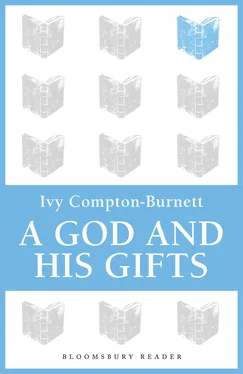Ivy Compton-Burnett
A God and His Gifts
“I will ask you once more. It is the last time. Will you or will you not?”
“I will not. It is also the last time. It must be the last.”
“You will not give me your reasons?”
“I will give you one. You have too much. Your house and your land. Your parents and your sister. Your sister who is also your friend. Your work and your growing name. I like things to be on a moderate scale. To have them in my hands and not be held by them.”
“That is not the only reason. There must be a deeper one.”
“There is. And it may be deep. I do not want to marry. I seldom say so, to be disbelieved.”
“You don’t feel that marriage would mean a fuller life?”
“I don’t want the things it would be full of. Light words are sometimes true.”
“Then there must be a change. I do want to marry. I want to have descendants. I want to hand down my name. I could not keep up our relation under a wife’s eyes. It has escaped my parents.”
“Your father I daresay. What about your mother?”
“I am not sure. It is hard to know.”
“It has not escaped her, or you would know. Silence has its use.”
The speaker’s indifference to convention appeared in her clothes, her cottage, and her habit of looking full at her companion and voicing her thought. She was a short, fair woman of about thirty, with a deep voice, a strongly cut face, and calm eyes that were said to see more than other people’s, and sometimes did. Her companion was a large, dark man, with solid, shapely features, heavy, gentle, nervous hands, strong, sudden movements and a look of smouldering force. He ignored convention in another way, and in one that was his own. A consciousness of being a known and regarded figure showed in his dress and his bearing, and was almost undisguised. The breach of family tradition involved in his leading a writer’s life in addition to a landowner’s, enhanced him in his own eyes and supported his conception of himself.
“Well, this is a last occasion. It becomes one. It is what you choose.”
“And what you do. I think you will be happy. And I hope she will. That is where the question lies.”
“If I marry her, she should be. I will do my part.”
“It will be easier than hers. I wonder if you know it.”
“Hers cannot be what yours would be. I am helpless there.”
“So am I. I am not fitted for an ordinary domestic life.”
“So I must live with someone who is. And I shall not see the life as ordinary. None is so to me.”
“How do you see your own life? It is even less so to you?”
“It is as it is. As I am what I am. I know I am a man of full nature. I know I am built on a large scale. I am not afraid to say it.”
“It is true that most people would be. If I thought it of myself, I should. So you can’t know if I think it. But do you know anyone who thinks he is built on a small scale?”
“I know many people who are. It is part of their interest to me.”
“But not of their interest to themselves. Do they know on what scale they are?”
“I am to marry someone who is on a moderate one, and who knows it.”
“Then I guess who it is. There is someone of whom it is true. And there would not be anyone else.”
“My father perhaps?”
“But you can hardly marry him, Hereward.”
“In effect I have done so. We are all wedded to each other. My wife must fit into a human framework. It is a demand I have to make.”
“And you feel you can make it. You know the woman who is to meet it. You are not in doubt.”
“I am not. I have my own knowledge of Ada Merton. Her qualities are many. I would not marry a woman I could not depend on and trust. I know I have had my early time. But in her own way she has had hers.”
“Well, there is the attraction of opposites. Though I never quite believe in it. It is safer to depend on qualities held in common. What will your parents feel about your marriage?”
“They will be glad to hear of it. They will welcome the thought of grandchildren. It is the natural, usual thing.”
“What of your sister? There is the touchstone. I will not speak of her scale. We do not question it.”
“She has always helped me. She will help me now. I have imagined her as your sister. I thought she would be.”
“But then I should be a sister too. And I have not a sister’s qualities. I don’t even know what they are. No doubt you can tell me.”
“I can, and they are great ones. I have seen some of them in you.”
“If you and I were married, think of the scale of our children! With both of us on such a considerable one. A house with such a brood! It could not stand.”
“It would have stood. But it was not to be. I wonder if you will regret it. People may see you as a disappointed woman.”
“They will. And I shall wish they knew I was not. I may be on a small scale after all.”
“You may be, Rosa. You are,” said Hereward with sudden force. “You are content with too little. My wife will have more than you. To have a thing we must accept it. You could be the first person in my life. You choose to be nothing, and it is what you will be. I cannot play a double part.”
“Not with me. But I should have thought you could. I fear you will, and I think you fear it. I know you, and you know yourself.”
“I do. I wish I did not. I know the forces within me. I know they may rise up at any time. As you have found, they have sometimes risen. I don’t exhaust them on my work. They are not easily spent. The effort seems to give them strength, to set them free. You have been my safeguard. You could always be.”
“No, the forces would be there. You are not for the single path.”
“Rosa, I shall be a good husband.”
“You may be what you mean by the words.”
“I will see that Ada finds me what she should.”
“In time she must find what you are. There is no escape.”
“Do I not offer a good deal?”
“What do you ask? Your home is your father’s. She will not be its mistress.”
“I did not know you considered such things.”
“I may not. We are not talking of me.”
“She is a good daughter and sister. She does not ask much for herself.”
“But now she may ask more. Will she marry to have the same?”
“She will have what I give her,” said Hereward, again with force. “She will take it and be content. What is the good of your rejecting me yourself, and bringing all this against my marrying someone else? You know the way to prevent it.”
“There is nothing against your marrying her. There is everything in its favour. I was saying what there was against her marrying you. Does she know what it is?”
“She knows nothing. She will know nothing. And there may be nothing to know.”
“Let there be nothing, Hereward. Let there always be nothing. It will help you both. And there are many of you, and there may be more. It will help you all.”
“My wife, there may be trouble coming. We will meet it with a brave heart. We have faced too much together to fail in these our latter days.”
“What have we faced, Michael? I don’t think I can remember anything.”
“Ah, Joanna, our home is in danger. This old roof over our heads. It has sheltered our fathers, and may not pass to our son. Hand-in-hand we came in, in our youth and hope. Hand-in-hand we would go out, depending on each other, and the knowledge that we had harmed no one. Ah, no one is the worse for our downfall. That must be our stay. Without it we were poor indeed.”
“It sounds as if we should be poor with it. And some people must be the worse, if you mean we are in debt.”
Читать дальше












